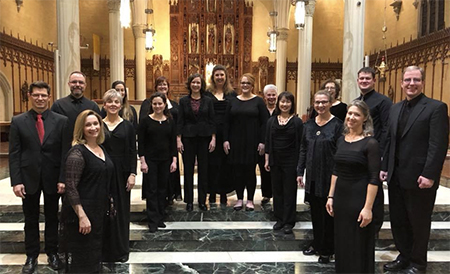by Timothy Robson

The veneration of Mary through music, poetry, and various acts of piety, dates back to the 5th century when the Council of Ephesus codified Mary as the Mother of God. As recently as the Second Vatican Council in the 1960s, Mary was identified as the mother of the Church.
The concert was organized in roughly chronological order, beginning with the Gregorian Salve Regina, performed by a unison quartet of women, who showed an authentic feel for the arc and phrasing of the chant.
Solo soprano Judith Acres followed with O tua suavissima by the 11th-century abbess, preacher, composer, and political advisor, Hildegard von Bingen. Hildegard’s works follow the melodic patterns of Gregorian chant but are virtuosic in their demands of phrasing and breath control, as well as in their extremes of vocal range. O tua suavissima presents a metaphor of Jesus springing forth from “the stem of Jesse.” With her high lyric quality, Acres has a perfect voice for this music, though some of her phrase endings were cut short — remnants of a cold?
Guillaume Dufay’s Conditor alme siderum brought together the whole ensemble, alternating unison with two-part passages. The next two works, Josquin de Prez’ double-choir motet Recordare Virgo Mater and Giovanni Pierluigi da Palestrina’s 8-part Magnificat, were sung with pure but robust choral sound and secure intonation.
The first half of the program ended with Giuseppe Tartini’s surprisingly cheerful setting of the Stabat Mater, in which Mary watches the death of Jesus from the foot of the cross, and a ho-hum rendition of Mozart’s motet Ave verum corpus.
The rest of the concert was devoted to works from the 19th through 21st centuries, beginning with three settings of Ave Maria, perhaps the most famous and most-often set of Marian texts. Brahms’s lovely — and rarely performed — setting was gentle, in a smoothly flowing triple meter. Fauré’s version is for two-part women’s voices with an elaborate arpeggiated piano accompaniment, capably played by Kevin Foster, who also sings countertenor in the ensemble. Gustav Holst made his short eight-part treble setting in 1900 in memory of his mother. The charming work was performed unsentimentally at a brisk tempo.
The last three works were from the current century. The late Alan Smith’s setting of “There is no rose of such virtue” is a welcome addition to settings of that text by Benjamin Britten, John Joubert, and others. It alternates between a cappella and piano-accompanied verses, with lyrical and overlapping phrases. Prolific Norwegian composer Ola Gjeilo is making a reputation for accessible, tonal music influenced by minimalism and by composers such as Arvo Pärt. His Ave Generosa (“Hail, girl of a noble house”) was representative of his pleasant but unmemorable style.
Graham Keitch’s newly commissioned O tua suavissima received its premiere performance. Keitch sets the same text as the Hildegard von Bingen work heard at the beginning of the program, but here in the style of Renaissance polyphony, with modern tonal harmonies. Silences between phrases played a role in the progress of the work, as did thin textures that suddenly became complex chords. It is worthy of more performances.
Published on ClevelandClassical.com March 5, 2018.
Click here for a printable copy of this article


